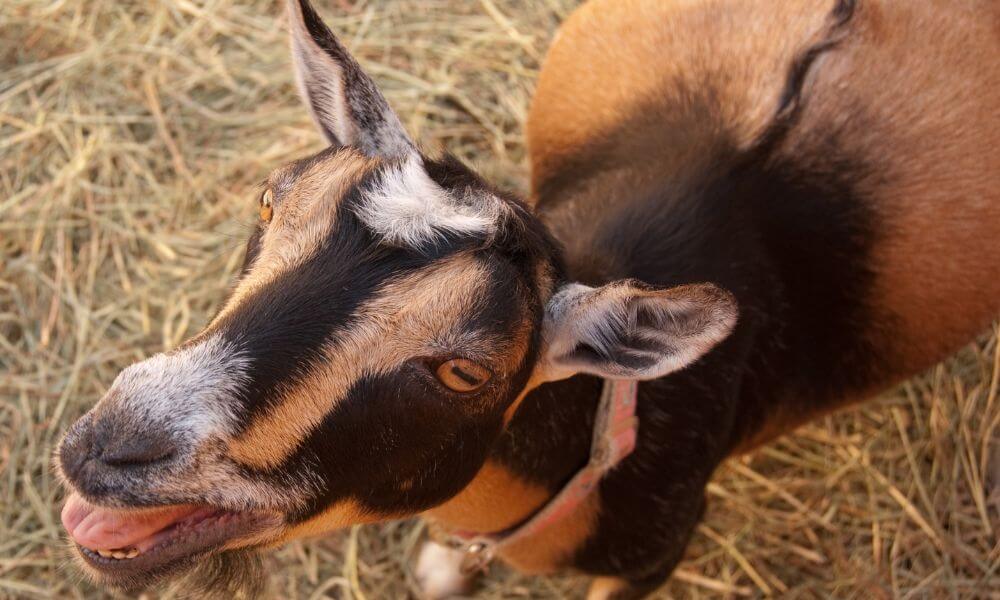On average, a Nigerian dwarf goat costs between $50-$125. They can cost as much as $200, depending on pedigree quality, coloring and other factors. For one goat, you would pay somewhere in this range—you must remember, however, that goats will not be happy without other goats to live with.
So, to buy a goat is not so expensive as to break the bank.
Again, these prices can vary depending on demand and availability, but you will generally pay somewhere in this range.
Buying the goat is just the first step, however.
You also have to consider the cost of caring for a goat over its lifetime, and also, as I said, the fact that goats will not be happy on their own.
You’ll need to have more than one.
So, let’s look at the cost of raising a Nigerian dwarf goat.

How much does it cost to raise Nigerian dwarf goats?
As the name implies and as I’m sure you know if you’re thinking of starting a herd, Nigerian dwarf goats are smaller than most breeds of goat.
For this reason, they do require less living space and less food than other breeds.
Nonetheless, all goats have needs much more complex than the average household pet who might eat the same thing for every meal.
First of all, you’ll have to consider the cost of hay, and what type of hay you will use.
Grass hay is generally fine for most goats.
However, kidding and milking goats, and kids themselves, may have slightly different needs.
Alfalfa hay is high in calcium, and is therefore very good for goats that are producing milk.
It can be expensive, however, at somewhere around $70 per pound.
What feed you need to provide will depend also on the pasture you have available.
Goats are browsing animals, which means they like to roam around and look for weeds and shrubs to eat.
It’s really important that your goats have access to a reasonably large pasture to roam.
Not just for the food, but also for the exercise and enrichment that this activity provides.
If there is a good variety of nutritious food available on your pasture, you could substitute alfalfa hay for alfalfa pellets and stick to grass hay.
Grains can be a useful addition to your goat’s diet, but usually it’s only necessary if they’re producing milk.
There’s no real substitute for high quality hay feed.
Your goats are also likely to need mineral supplements, depending on the food available in your pasture.
On the highest quality feed, they would only need small amounts of supplements, but for the healthiest goat it’s usually recommended.
High quality goat mineral supplements can cost around $50 per pound, though this will be enough to last a good while.
Shelter and enclosure needs are a big initial cost, though you will have to spend money to maintain them over the years.
They’ll need a fence around their pasture both to keep them in and predators out.
They’ll also need individual sleeping spaces, about the size of a dog’s kennel.
Goats also like to stay out of the rain, so they should have some space in their shelter to group together.
So, if you don’t already happen to have a barn on your property, you will need to look at getting a fairly large structure built.
This will be a big cost initially.
Are Nigerian dwarf goats good pets?
With all that in mind, let’s look at a simpler question—are Nigerian dwarf goats good pets?
Absolutely they are.
They are very playful and sociable, as most goats are, and they bond strongly both to their herds and to their owners.
They cannot be kept in the house, however, so keep that in mind—to be happy, and in turn to be good pets, they will need all the things I just mentioned.
Pretty much any breed of goat will make a good pet, if they have all their needs met.
But the thing to keep in mind is they are not like cats or even dogs.
They have much different needs.
Take, for example, milking.
If you want to both have a pet goat and have fresh goat’s milk available, you will have to milk any lactating goats every day, sometimes even twice a day.
If you don’t, they can become very ill.
This is not a small job, and can be time-consuming.
It is, of course, also very rewarding, but you need to be sure that you have the right lifestyle to accommodate their needs.
If you do, you’ll have a great pet in your Nigerian dwarf goat.
So, Nigerian dwarf goats are not especially expensive to buy, at least as pets.
Some goats intended either for breeding pedigree or for high-quality milk (that is, goats who will be bought for farms) can be more expensive.
The initial cost of purchasing the animal is likely to be the lowest on your list of expenses.
The real expenses are in properly caring for it.
Making sure it has the correct space and feed is not necessarily cheap, but is well worth it.
With all that in mind, a Nigerian dwarf goat companion is well worth the cost.
